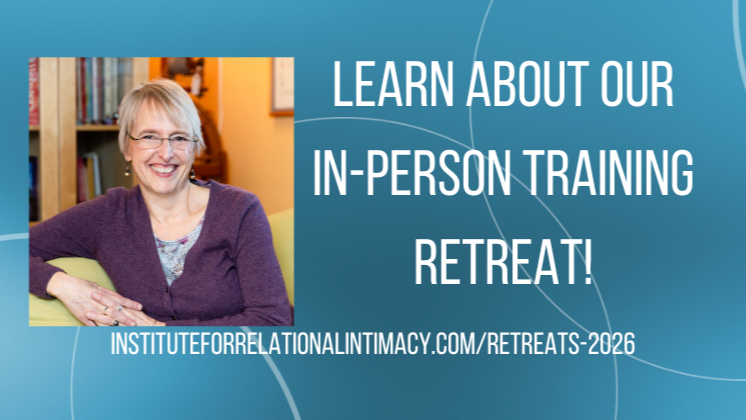Cultivating Desire for Your Partner
May 26, 2022
Don’t wait for your partner to change
I often have clients come to me with the stated goal “I want to feel desire for my partner again.” This is not a bad goal at the surface. However, I often discover that underneath they are harboring a hope that their partner will change in some manner. The assumption is that if the partner would change, then renewed attraction, leading to desire, would automatically bloom.
There are two problems here:
- Nobody can change your partner other than your partner, so if you’re focusing your attention and aspiration on the hope that your partner will change something, you are destined to feel frustrated, disappointed, and powerless to improve your own happiness. Your partner might change, but if so, it will be because they want to, for their own reasons and freely chosen.
- While desire can certainly be inspired by things outside of yourself, it is primarily about the relationship and connection between you and yourself–your attention, presence, focus, and awareness. So even if your partner decides to change in exactly the ways you want them to, you may still not experience the desire you are hoping for. More importantly, you probably can generate a lot of interest, curiosity, attraction, fascination, and desire–both for your partner, and for life in general–without your partner changing anything about themselves at all.
Shift your attention from them to you
Here’s a hard pill to swallow: I can’t change your partner, and neither can you. Rather than focusing on what you want them to change, or what annoys you about them, tune in to what’s going on inside yourself. How are you showing up in your relationship? What change in yourself would be both meaningful to you, and also have a positive effect on your relationship?
For instance, if you want to feel turned on, what do you do to experience a feeling of being turned on? When in your life do you feel really alive, juicy, engaged, and fully awake…or in other words, turned on? If you’re getting a sense that this isn’t just about sex, you’re exactly right. Sex is one way to experience engagement and juiciness, but it is not the only way by a long shot. It is easy to lose the habit of engagement, presence, and attention. This is true of sex, and also of zest for life in general; it’s actually possible to build a habit of tuning in to what’s joyful and pleasurable, and building that skillset will most likely improve your life in a whole variety of areas, including but not limited to your erotic life. If you want to feel turned on, you probably need more of a lot of things, including focus, attention, pleasant experiences, awareness of sensation in daily life, awareness of positive experiences, and some practice enhancing and sustaining these turned-on moments by using your mind to make them stronger, rather than weaker.
Which brings us to another important question: what do you do now that results in turning yourself off? Turn-offs probably include thoughts about yourself, thoughts about your partner, thoughts about life in general and your future together. Can you identify some of your “turn-off” thoughts? When do they tend to crop up? Can you imagine what thoughts you might choose to think instead, that could turn you on instead of off?
Actions can also be turn offs. For instance, do you turn on the TV when you’re spending an evening together, or do you pour your partner a cup of tea and ask them about their day with genuine curiosity? Consider: What actions do you choose that effectively turn yourself off? What actions could you choose instead, that might turn you on? (Spoiler alert: choosing actions that encourage engagement and curiosity, interest and positivity may also result in engaging your partner in a new way that feels fun for everyone).
The magic of systemic interactions
Now that you are widening your focus to include things other than sex, and applying your creativity to your own thoughts, feelings, and actions, rather than focusing on what annoys you about your partner, you are on the right track. This is what I call The Happiness Project, and it should be fun! As you experience more pleasure in your day-to-day life and choose to focus on where you’re going rather than on what didn’t work in the past, you’ll most likely experience more desire and interest in life, and possibly also sex, and, have more fun. This is very likely to lighten everyone else’s outlook around you as well as your own. Powerful change begins to happen not just within you, but also between partners when you get your attention off of your partner’s failings and onto creating happiness yourself.
That’s a great starting point. But you can take it to the next level; things really start to become magical when you also invite your partner to share in your happiness, invite them to find ways to experience more day-to-day pleasure as well, and remind them often that they are an important part of your happiness. You might enjoy having conversations together about what you want to create in your lives together. What are each of your dreams? What kinds of activities do you miss, or would you like to explore? It’s not important that you agree; instead, focus on exploring freely, and practicing non-judgment and curiosity.
Taking it to the sexual realm
If you are wondering what all of this has to do with sex, here it is. Some components of great sex include:
- focused attention
- positive regard
- collaboration
- embodiment
- physical pleasure
- creativity
- the ability to create a world outside of time and free of judgment.
It is no coincidence that people who experience lackluster desire, and who want to experience more desire, are often quite far away from experiencing at least some of the things on this list. Any aspect of life where you can build these skills and create these experiences for yourself and your partner makes it easier to experience them when you are being sexual.
When you read the above list of skills and attributes, which do you excel at? Which could you stand to strengthen? What are you doing now to help yourself and your partner feel relaxed, adored, important, interesting, and engaged with one another?
The blog was originally published in Psychology Today.






